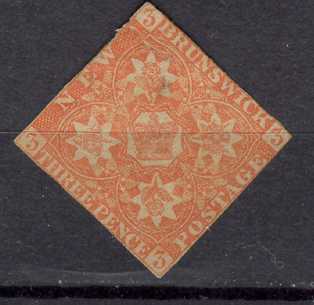
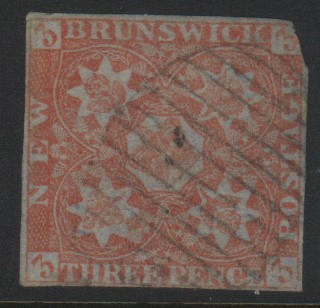
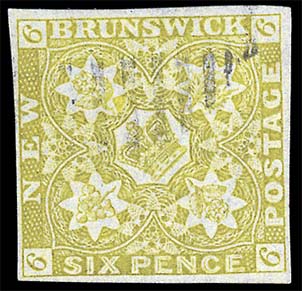
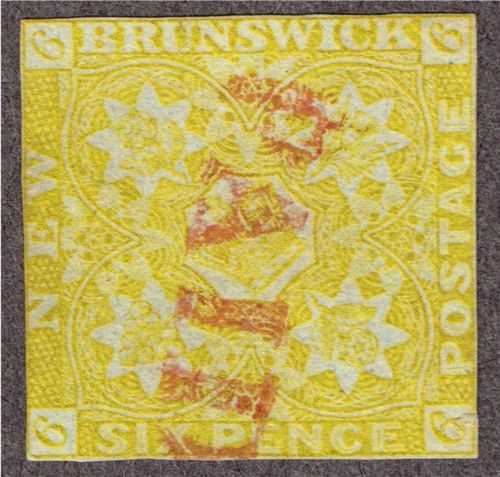
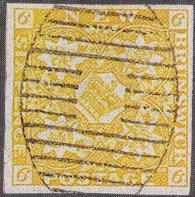
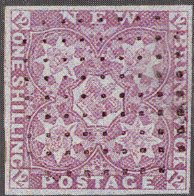
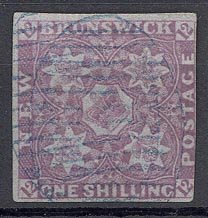
Note: on my website many of the
pictures can not be seen! They are of course present in the cd's;
contact me if you want to purchase them: evert@klaseboer.com.
A province of Canada, issued stamps until 1867
3 p red 6 p yellow 1 Sh violet
Value of the stamps |
|||
vc = very common c = common * = not so common ** = uncommon |
*** = very uncommon R = rare RR = very rare RRR = extremely rare |
||
| Value | Unused | Used | Remarks |
| 3 p | RRR | RRR | |
| 6 p | RRR | RRR | |
| 1 Sh | RRR | RRR | |


Official reprints exist of all three values. The colours are different: 3 p orange, 6 p violet and 1 Sh violet. They are all printed on white paper (originals on bluish paper).
There are some very dangerous forgeries, in which the size of the stamp is slightly larger (23.8 mm instead of 23.0 mm, source: 'Fakes & Forgeries of New Brunswick & Prince Edward Island by Captain R.B.Mitchell) and the colours are slightly different. Another dangerous set of forgeries bears the cancel '8' in a grid (made by Oneglia/Panelli) and there is a small line from the thistle (the flower at the right hand side of the crown) to the background.
In the above forgery, the flower in the lower right corner is upside down (it is pointing towards the crown)! The stems of the flowers must point to the crown. The background behind the outer inscriptions is completely solid. Besides the 5-lines cancel shown above, I have also seen this forgery with a cancel consisting of 4 concentric circles, roughly the size of the stamp. It is believed that Spiro made this forgery (there also exists another Spiro forgery, see next forgery).
The octogonal outline round the center is double in the above forgeries. The postmarks on these forgeries seem to be a large diamond, containing 6 parallel lines or the one indicated on the right (a quartefoil). Also note the unclear circular postmark 'DOCTWL... VF' (unreadable letters, a cancel often used on other forgeries of other countries as well). Note that all the numerals '3' in the corners are directed towards the center of the stamp, while in the genuine stamp they are all pointing downwards, this is the easiest test to determine these forgeries (this forgery is also described in 'The Spud Papers'). It is believed that Spiro made this forgery.
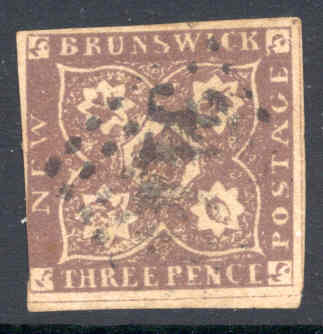
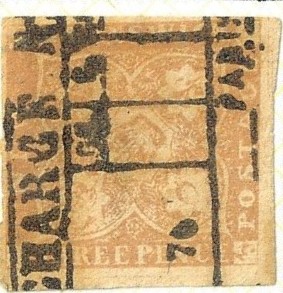
I've also seen this forgery with a numeral dot cancel '2479' and
'1959'. I've also seen it with a circular cancel with unreadable
letters and a sun(?) in the center. I am not able to read the
number in the above numeral cancel ('31??').
In this forgery the crown is too small also (it should almost touch the octagonal), and furthermore the inscriptions are not in the right place (or the crown is not placed correctly)! Also note that the flower at the right hand side of the crown (turn the stamp) has been replaced by somekind of a berry. It is supposed to have been made in Italy. A better version, but with the same errors exists and is sometimes said to be a Fournier forgery (but this is not sure), it then bears a square cancel consisting of small dots.
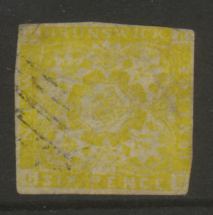
Note the position of the '6' in the corners in the above forgery of the 6 p.
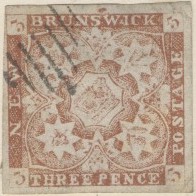
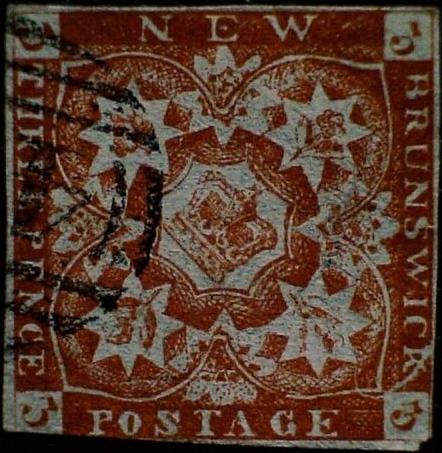
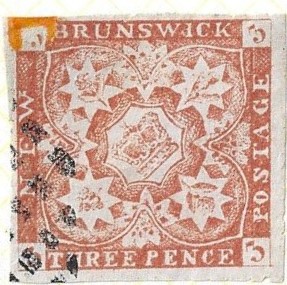
The 3's in the corners are totally different from the genuine
stamp. I've also seen it cancelled with a pattern of dots.
Oneglia forgeries are engraved. Note that they are cancelled with a grid '8' cancel. According to the journal BNA Topics (May, 1972 page 116), in an article called 'The Panellis' by E.A.Smythies, this forged cancel has two unbroken lines besides the '8', while the genuine cancel only has one such line. The genuine cancel '8' belongs to Chatham New Brunswick, it was also applied by Oneglia/Panelli on forgeries of Nova Scotia and Newfoundland.
Some forgeries, all made by the same forger 'A':
The above forgeries are often referred to as forgeries made by forger 'A' (the identity of this forger is unknown'. The name 'forger A' was suggested by Nicholas Argenti in his book 'The Postage Stamps of New Brunswick and Nova Scotia'. Often these forgeries have an overprint 'FAC-SIMILE' (which is sometimes erased and/or covered by a cancel). These forgeries are engraved.
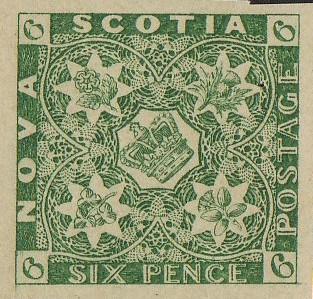
I've been told that this forgery of the 6 p Nova Scotia stamp has
been made by the same forger 'A' as the above three forgeries.
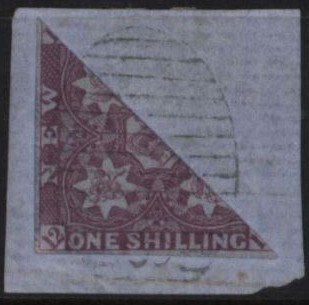
Genuine stamp, but forged bisected use.
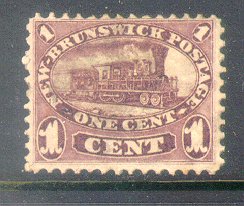
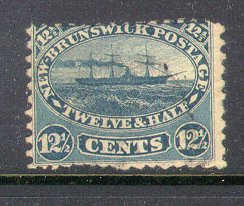
1 c lilac (train) 2 c orange (Queen Victoria) 5 c green (Queen Victoria) 10 c red (Queen Victoria) 12 1/2 c blue (ship) 17 c black (prince of Wales)
These stamps are peforated 12
Value of the stamps |
|||
vc = very common c = common * = not so common ** = uncommon |
*** = very uncommon R = rare RR = very rare RRR = extremely rare |
||
| Value | Unused | Used | Remarks |
| 1 c | *** | *** | |
| 2 c | ** | *** | |
| 5 c | * | ** | |
| 10 c | *** | *** | |
| 12 1/2 c | *** | *** | |
| 17 c | *** | *** | |
Forgeries, examples:
Spiro forgeries:
Forgeries of the 2 c, 5 c and 10 c (as images above) exist with no '-' between 'NEW' and 'BRUNSWICK'. Another easy way to identify these forgeries are the cancels (these cancels were never used in New Brunswick). Note, that there appear to be two types of the 10 c forgeries, differing in the positions of the 'X's in the upper corners.
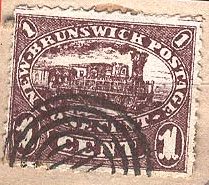
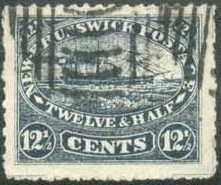
(Spiro forgeries of the 1 c and 12 1/2 c)
The above forgery of the 17 c stamp is made by Spiro I presume. There should be a brooch on the shoulders of the Prince, but it is absent in this forgery. The lines of tartan coming from the Prince's shoulder are ending on the first stroke of the first 'N' of 'SEVENTEEN' and the 'T' of this word, in the genuine stamps it ends in the center of the first 'N' of this same word. This forgery has been described in 'The Spud Papers'.

Slightly different forgery of the 17 c; the '17' and the
lettering are different from the above forgery.
Other forgeries:
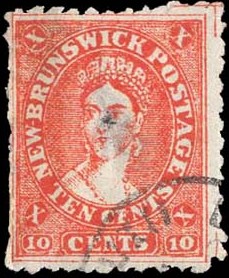
A forgery of the 10 c resembling the above Spiro forgeries, but
there is a '-' between 'NEW' and 'BRUNSWICK'; also the 'X' in the
upper left corner is again differently placed.
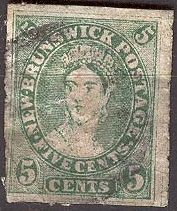
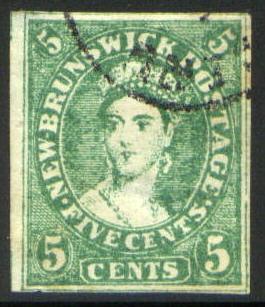
(Some other imperforate forgeries)
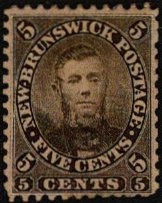
(5 c brown with Charles Connell)
A 5 c brown with the head of Charles Connell was prepared, but not issued (extremely rare). This stamp in imperforate condition is a proof (still very rare):
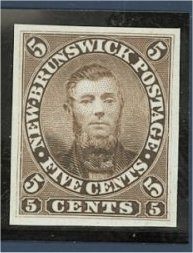
These proofs (on thick paper) exist thinned and perforated pretending to be genuine stamps.
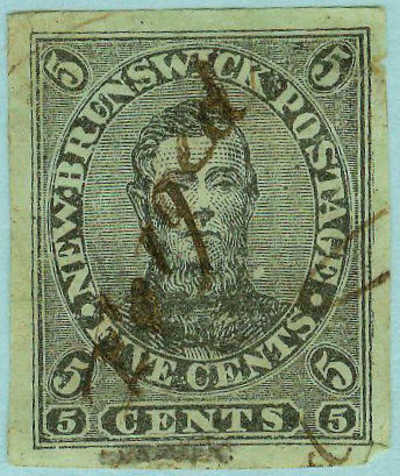
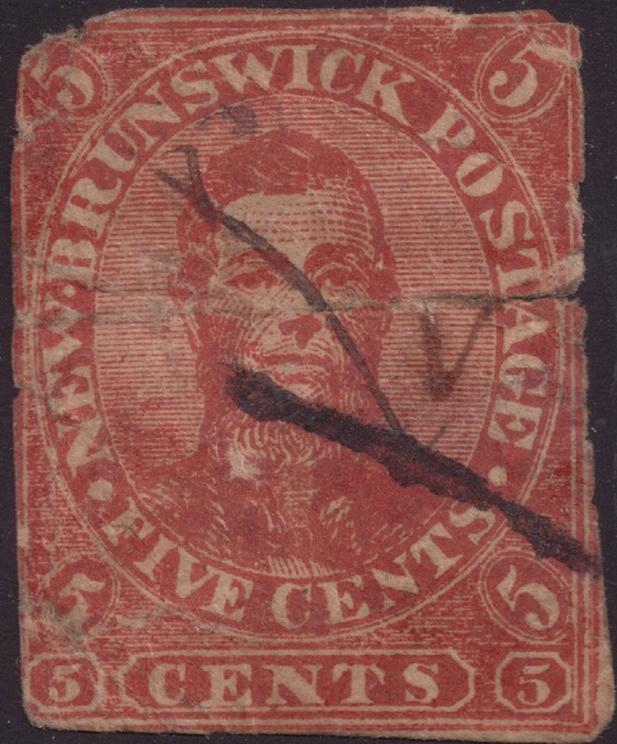
Forgeries, even in the wrong color (red)
Several modern reproductions of this stamp also exist. A nice site on this stamp can be found at: http://www.rpsc.org/cp/charles_connell.html.
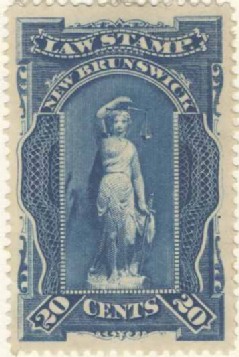
10 c blue 10 c yellow 20 c blue 20 c orange 50 c blue 50 c brown 2 $ blue 5 $ green
The blue stamps were issued in 1884, the other colours in 1887-1890.
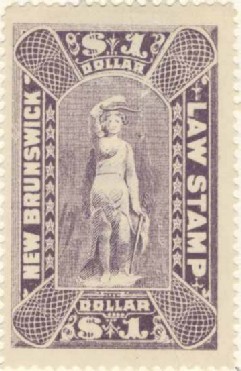
20 c orange 50 c brown 1 $ violet 5 $ green
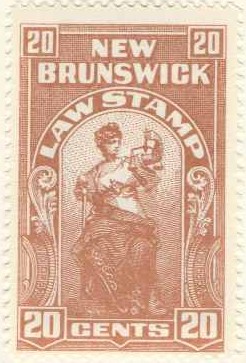
10 c orange 20 c red 50 c brown 1 $ lilac 2 $ blue 5 $ green
Usually, these stamps are perforated, but they also exist rouletted (1977?).
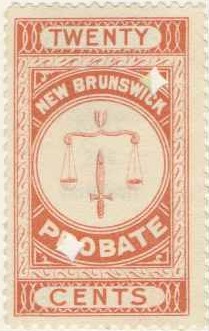
10 c yellow 20 c red 50 c brown 2 $ blue 5 $ green 20 $ violet
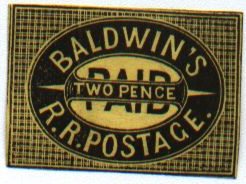
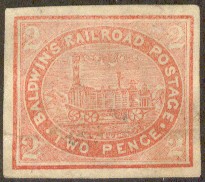
These labels are forgeries made by (or inspired by) Allan Taylor in or before 1865 with the help of Craig and Melvin (both stamp dealers in Canada). The train design exists in a number of colors (red, blue, brown, black) and on colored paper. A sub-type seems to have a blotch in the frameline next to the bottom left '2'. The design with 'PAID' in the ellipse seems also to exist in the colors 2 p black on red and 2 p black on green.
More pictures acan be found at: http://alphabetilately.com/US-trains-00.html.
The following text was found in the Stamp Collector's Monthly Magazine of 1866 (Vol.1, No. 10) of St.John, New Brunwick by George Steward Jr. concerning the Baldwin stamps:
A TIMBROPHILIC BUBBLE BURST!
STAMP COLLECTORS BEWARE!!
AN EXPOSE!!!
BALDWINS RAILROAD POSTAGE : an obsolete local of considerable
rarity"-as it is impudently termed by dealers interested in
its sale-is attracting some attention at present in Philatelic
Circles. Of course the venders of these stamps affirm stoutly
that they are genuine ; but we beg to assure buyers that this is
not the case. The "Baldwin" is a forgery and the Boston
dealer who now advertises it as genuine knows that it was made to
sell only. For the information of our readers we submit
a brief historical sketch-gleaned from authentic sources - of
this stamp.
In the month of May last two young gentlemen belonging to this
city entered into copartnership - which for distinction sake we
shall call Messrs "A. and B., Stamp and Coin dealers.'' They
had been in business but a short time when it occurred to them
that they might "get up" a stamp. Others had done so
with some degree of success, why could not they? Only represent
it to their correspondent as a genuine "local" issued
and used in the province of New Brunswick, and by its sale they
might easily replenish their coffers, and increase their business
many fold. Having hit upon this "happy thought " the
next thing wanted was a name and date. The latter was easily
settled ; it should be an obsolete local, for this would
sell best and be least liable to detection. But the name, -what
should it be? This was a puzzler ! It could not be "Turner's
" -or the " Eastern'' Express, for both of these
companies had agents in almost every city, town and village of
the Union, as well as in the British Provinces, an application to
either of whom might ''spoil their leetle game."
After much grave thought and consideration it was remembered that
a Mr. H. Baldwin had had some years before, an express office on
the European and North American Railway, which runs from St. John
to the Shediac oyster beds. Why not therefore call the
"obsolete local" BALDWIN'S RAILROAD POSTAGE
Nothing could be more favourable and the name was at once
adopted. After sketching a rough design of the projected
"obsolete," the honourable firm went next in
search of an engraver whom they soon found in the person of a Mr.
Gregory of this city. Mr. Gregory being an adept in his art soon
furnished a block or cut of the new stamp, which was taken to the
printing establishment of Messrs J. & A. McM..... of St.John,
and shortly after our enterprising young gents had the
satisfaction of gazing upon the fruit of their own ingenuity-or
in other words upon fifteen hundred of the "BALDWIN'S
RAILROAD POSTAGE LABELS" in the following colours: viz, red
on white, blue on ditto., black on ditto., red on grey, blue on
ditto, black on ditto, red on green, blue on ditto, black on
ditto, red on yellow, blue on ditto, black on ditto, red on blue,
blue on ditto., black on ditto. That such stamps should be
rare-very rare indeed- no one can doubt, for they could only be
had from the makers. We do not know that the manufacturers are to
blame altogether for saying that these stamps were of
"considerable rarity" -seeing they could only be
obtained from themselves, -but every honest man will say that
they were very much to blame for stating that they were NEW
BRUNSWICK LOCALS. But further, we have it on good authority, that
of these " gems, "four hundred were sold to S. Allan Taylor of Boston -
as stamps that never existed, but were issued to
sell only. Mr. Taylor knows all this, but does he denounce
the imposition? oh no! On the contrary, he tries to bolster it up
by "a change of base," and mendaciously says in his
paper, " that the New Brunswick to which these bogus
"obsolete locals'' belong is New Brunswick - New Jersey!!!
Could anything be more audacious? Can he tell us or his readers
when these TWO PENNY locals were issued and used
in New Jersey? and why it is that no mention is made in any of
the NewY ork Price Lists or American Catalogues of the U. S.
local stamps? We hope that our readers will make a note of what
we have said and avoid the Bogus " Baldwin's."
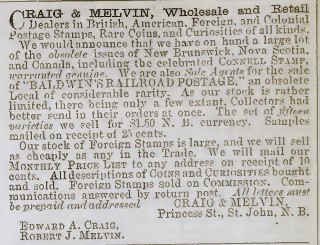
Advertisment of Edward A.Craig & Robert J.Melvin in the Stamp
Collector's Monthly Gazette (Vol. 1, No 1. 1865, page 4) stating
that they are 'sole agents for the sale of BALWIN'S RAILROAD
POSTAGE, an obsolete local of considerable rarity'. They
sold the set of 15 varieties for $1.50 N.B. currency